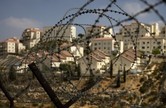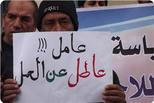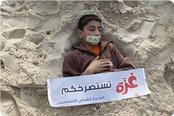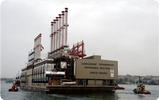7 nov 2014

PNN correspondence revealed, on Thursday, that the UN has decided to deduct $30m worth of "administrative costs" from the aid donated for reconstructing the Gaza Strip.
An Egyptian official, speaking on condition of anonymity, reportedly said that a number of media outlets announced a deduction of some $800,000 by the UN, as a first payment for about 24,000 UN employees. He further stated that the total sum deducted from the expected financial aid for Gaza is $30 million, according to Days of Palestine news publication.
Egypt's foreign ministry was said to have expressed "extreme surprise" over the United Nation's decision to deduct the funds, which are urgently and immediately needed by Gaza residents.
PNN notes that the UN has suggested a proposal for the entry of construction materials to the Strip that has been described as an extension for the Israeli siege on the enclave.
The International Donors Conference, held in Cairo last month, documented some $5.4 billion pledges by the international community.
In related news, Al Ray further reports that Qatar has pledged to fund the purchase of fuel needed to operate Gaza's only power plant for a three-month period:
"Qatari Prime Minister Abdullah bin Nasser bin Khalifa Al-Thani has informed Ismail Haniyeh, deputy head of Hamas' political office, that his country planned to make a deposit in the Palestinian Authority's treasury earmarked for the purchase of fuel for Gaza's power plant for three months," read a recent statement from Deputy Haniyeh's office.
PM Al-Thani's reaffirmation of his country's support for the Palestinian people, and especially those in the devestated Gaza Strip, was highlighted in the statement. Gaza's sole power plant went offline on July 29th of this year, after its main fuel tank was attacked from the air by Israeli jets.
(Palestinians have no official military to speak of; Gaza's response to the months of relentless provocations which preceded Israel's assault on the region was assumed, once again, by armed partisan factions who, despite staunch resistance, were helpless to defend Gaza's civilian infrastructure.)
Furthermore, even though the plant remains functional, it has stopped running due to chronic fuel shortage.
A relatively small stretch of land, and exceedingly overpopulated, the Gaza Strip is said to require around 360 megawatts per day – of which only 200 megawatts are currently available – to meet the needs of some 1.9 million residents. Before the air strikes, residents were making due with 8 or less hours of electricity per day.
Gaza currently has three sources for electricity, Al Ray reports: Israel, which provides 120 megawatts; Egypt, which supplies 28 megawatts; and Gaza's power plant, which generates between 40 and 60 megawatts on average, per day.
An Egyptian official, speaking on condition of anonymity, reportedly said that a number of media outlets announced a deduction of some $800,000 by the UN, as a first payment for about 24,000 UN employees. He further stated that the total sum deducted from the expected financial aid for Gaza is $30 million, according to Days of Palestine news publication.
Egypt's foreign ministry was said to have expressed "extreme surprise" over the United Nation's decision to deduct the funds, which are urgently and immediately needed by Gaza residents.
PNN notes that the UN has suggested a proposal for the entry of construction materials to the Strip that has been described as an extension for the Israeli siege on the enclave.
The International Donors Conference, held in Cairo last month, documented some $5.4 billion pledges by the international community.
In related news, Al Ray further reports that Qatar has pledged to fund the purchase of fuel needed to operate Gaza's only power plant for a three-month period:
"Qatari Prime Minister Abdullah bin Nasser bin Khalifa Al-Thani has informed Ismail Haniyeh, deputy head of Hamas' political office, that his country planned to make a deposit in the Palestinian Authority's treasury earmarked for the purchase of fuel for Gaza's power plant for three months," read a recent statement from Deputy Haniyeh's office.
PM Al-Thani's reaffirmation of his country's support for the Palestinian people, and especially those in the devestated Gaza Strip, was highlighted in the statement. Gaza's sole power plant went offline on July 29th of this year, after its main fuel tank was attacked from the air by Israeli jets.
(Palestinians have no official military to speak of; Gaza's response to the months of relentless provocations which preceded Israel's assault on the region was assumed, once again, by armed partisan factions who, despite staunch resistance, were helpless to defend Gaza's civilian infrastructure.)
Furthermore, even though the plant remains functional, it has stopped running due to chronic fuel shortage.
A relatively small stretch of land, and exceedingly overpopulated, the Gaza Strip is said to require around 360 megawatts per day – of which only 200 megawatts are currently available – to meet the needs of some 1.9 million residents. Before the air strikes, residents were making due with 8 or less hours of electricity per day.
Gaza currently has three sources for electricity, Al Ray reports: Israel, which provides 120 megawatts; Egypt, which supplies 28 megawatts; and Gaza's power plant, which generates between 40 and 60 megawatts on average, per day.
5 nov 2014

The United States Agency for International Development (USAID) announced, today, a U.S. contribution of $100 million in budget support for the Palestinian Authority (PA), according to an official press release.
WAFA reports that, in a ceremony at the Office of Prime Minister Rami Hamdallah, Minister of Finance Shukri Bishara, U.S. Consul General, Michael Ratney, and U.S. Agency for International Development (USAID) West Bank and Gaza Mission Director Dave Harden announced the U.S contribution to the PA.
At the October 2014 Gaza Donors Conference in Cairo, US Secretary of State John Kerry announced $414 million in U.S. assistance to the Palestinians, which designated $212 million to be delivered through USAID.
Today's transfer will be used to directly pay for fuel purchases and support of six hospitals in occupied East Jerusalem, allowing them to continue to provide critical services to the public.
In light of the tumultous escalation of violence in East Jerusalem, as well as Israel's continued policy of settlement expansion in the face of international pressure to resolve this historical conflict peacefully, several countries including France, Britain and Sweden have expressed dissent with Israel's handling of its affairs.
A former Israeli prison guard turned journalist, recently quoted a US official in The Atlantic:
"’The good thing about Netanyahu is that he’s scared to launch wars,’ the official said, expanding the definition of what a chickenshit Israeli prime minister looks like. ‘The bad thing about him is that he won’t do anything to reach an accommodation with the Palestinians or with the Sunni Arab states. The only thing he’s interested in is protecting himself from political defeat. He’s not [Yitzhak] Rabin, he’s not [Ariel] Sharon, he’s certainly no [Menachem] Begin. He’s got no guts.’"
See http://original.antiwar.com/justin/2014/10/30/the-chickenshit-lobby-is-mad-as-hell/ for details.
Furthermore, the Japanese government, in a Wednesday press release, urged Israel to desist from implementing its plans for the construction of 500 new settlement units in occupied East Jerusalem, for the sake of progress in the peace process.
The statement deeply deplored Israel’s approval to advance the construction plans, calling upon Israel to refrain from any unilateral act which would change the current status of East Jerusalem, as well as the West Bank.
“As the Government of Japan has repeatedly expressed, The Israeli decision has a negative impact on the current security situation in Jerusalem and the ceasefire agreement regarding the Gaza Strip, and clearly goes against the ongoing efforts by the international community toward realizing a two-state solution,” said the release.
“Settlement activities are a violation of international law, and Japan has repeatedly called upon Israel to fully freeze settlement activities...
“Japan once again strongly urges both Israeli and Palestinian sides to act to enhance mutual trust and continue to make steady efforts for peace,” it concluded.
Spain, as well, expressed regret and condemned the decision, by Israeli authorities, to proceed with the construction,according to the Spanish Ministry of Foreign affairs' website:
“The Government of Spain believes that this type of unilateral action contributes to making the future formation of a Palestine State unworkable and is therefore incompatible with Israel's formal commitment to negotiate with the Palestinians to achieve a peaceful, global and lasting solution based on the two-State principle.”
WAFA reports that, once again, Spain has reiterated its position on the illegal nature of all settlements, a position it shares with the international community -- that the settlements are illegal under international law.
In related news, Director of the Middle East and North Africa Programme at Amnesty International, Philip Luther, said that “Israeli forces have brazenly flouted the laws of war during the 51-day war on Gaza by carrying out a series of attacks on civilian homes, displaying callous indifference to the carnage caused.” (Full report at WAFA Palestinian News & Info Agency.)
WAFA reports that, in a ceremony at the Office of Prime Minister Rami Hamdallah, Minister of Finance Shukri Bishara, U.S. Consul General, Michael Ratney, and U.S. Agency for International Development (USAID) West Bank and Gaza Mission Director Dave Harden announced the U.S contribution to the PA.
At the October 2014 Gaza Donors Conference in Cairo, US Secretary of State John Kerry announced $414 million in U.S. assistance to the Palestinians, which designated $212 million to be delivered through USAID.
Today's transfer will be used to directly pay for fuel purchases and support of six hospitals in occupied East Jerusalem, allowing them to continue to provide critical services to the public.
In light of the tumultous escalation of violence in East Jerusalem, as well as Israel's continued policy of settlement expansion in the face of international pressure to resolve this historical conflict peacefully, several countries including France, Britain and Sweden have expressed dissent with Israel's handling of its affairs.
A former Israeli prison guard turned journalist, recently quoted a US official in The Atlantic:
"’The good thing about Netanyahu is that he’s scared to launch wars,’ the official said, expanding the definition of what a chickenshit Israeli prime minister looks like. ‘The bad thing about him is that he won’t do anything to reach an accommodation with the Palestinians or with the Sunni Arab states. The only thing he’s interested in is protecting himself from political defeat. He’s not [Yitzhak] Rabin, he’s not [Ariel] Sharon, he’s certainly no [Menachem] Begin. He’s got no guts.’"
See http://original.antiwar.com/justin/2014/10/30/the-chickenshit-lobby-is-mad-as-hell/ for details.
Furthermore, the Japanese government, in a Wednesday press release, urged Israel to desist from implementing its plans for the construction of 500 new settlement units in occupied East Jerusalem, for the sake of progress in the peace process.
The statement deeply deplored Israel’s approval to advance the construction plans, calling upon Israel to refrain from any unilateral act which would change the current status of East Jerusalem, as well as the West Bank.
“As the Government of Japan has repeatedly expressed, The Israeli decision has a negative impact on the current security situation in Jerusalem and the ceasefire agreement regarding the Gaza Strip, and clearly goes against the ongoing efforts by the international community toward realizing a two-state solution,” said the release.
“Settlement activities are a violation of international law, and Japan has repeatedly called upon Israel to fully freeze settlement activities...
“Japan once again strongly urges both Israeli and Palestinian sides to act to enhance mutual trust and continue to make steady efforts for peace,” it concluded.
Spain, as well, expressed regret and condemned the decision, by Israeli authorities, to proceed with the construction,according to the Spanish Ministry of Foreign affairs' website:
“The Government of Spain believes that this type of unilateral action contributes to making the future formation of a Palestine State unworkable and is therefore incompatible with Israel's formal commitment to negotiate with the Palestinians to achieve a peaceful, global and lasting solution based on the two-State principle.”
WAFA reports that, once again, Spain has reiterated its position on the illegal nature of all settlements, a position it shares with the international community -- that the settlements are illegal under international law.
In related news, Director of the Middle East and North Africa Programme at Amnesty International, Philip Luther, said that “Israeli forces have brazenly flouted the laws of war during the 51-day war on Gaza by carrying out a series of attacks on civilian homes, displaying callous indifference to the carnage caused.” (Full report at WAFA Palestinian News & Info Agency.)
26 oct 2014

The Palestinian central bureau of statistics said there are more than 300,000 citizens with no jobs in the West Bank and the Gaza Strip according to data collected during the second quarter of 2014. A report released by the bureau on Saturday stated that about 328,000 Palestinian citizens have no jobs, more than 200,000 of them are in Gaza.
Accordingly, the unemployment rate in the second quarter of the current year amounted to about 18.2 percent in the West Bank and to 44.5 percent in Gaza.
These high unemployment levels in the West Bank and Gaza led to an increase in the rates of poverty and food insecurity among the Palestinian families, the report noted.
Accordingly, the unemployment rate in the second quarter of the current year amounted to about 18.2 percent in the West Bank and to 44.5 percent in Gaza.
These high unemployment levels in the West Bank and Gaza led to an increase in the rates of poverty and food insecurity among the Palestinian families, the report noted.
1 oct 2014

"Resuming the operations of Gaza power plant (GPP) is contingent on securing the necessary fuel," the United Nations Office for the Coordination of Humanitarian Affairs (OCHA) announced Monday, in its weekly 'Protection of Civilians' report.
The report explains, according to Al Ray, that the GPP shut down on July 29th, after being hit several times by Israeli attacks, subsequently rendering the Gaza Strip to be exclusively dependent on electricity purchased from Egypt and Israel.
Also noted was the fact that, even if fuel is secured, it will be difficult to provide service to the areas most affected from the last Israeli aggression on the region, such as Beit Hanoun, Al-Shuja'eyyah, Khuza'a and eastern Rafah.
The facility is Gaza's only power plant and electricity outages now exceed 18 hours per-day, severely disrupting the provision of basic services including health and water throughout the region.
Prior to the assault, residents in the Gaza Strip were surviving on some 8 hours of electricity per day.
The report explains, according to Al Ray, that the GPP shut down on July 29th, after being hit several times by Israeli attacks, subsequently rendering the Gaza Strip to be exclusively dependent on electricity purchased from Egypt and Israel.
Also noted was the fact that, even if fuel is secured, it will be difficult to provide service to the areas most affected from the last Israeli aggression on the region, such as Beit Hanoun, Al-Shuja'eyyah, Khuza'a and eastern Rafah.
The facility is Gaza's only power plant and electricity outages now exceed 18 hours per-day, severely disrupting the provision of basic services including health and water throughout the region.
Prior to the assault, residents in the Gaza Strip were surviving on some 8 hours of electricity per day.
30 sept 2014

The Popular Committee against the Siege confirmed that the per capita income in the Gaza Strip has dramatically decreased to one dollar a day following the Israeli recent aggression and as a result of the ongoing blockade. The committee confirmed that this rate has been the lowest since Israel imposed tight blockade on the Strip in 2007.
More than one and a half million citizens in Gaza depend on aid to survive, the committee added, pointing out that unemployment rates in the besieged Strip had surged 65 percent following the last Israeli war.
The committee stressed the importance of allowing construction materials into the Strip in order to accelerate the rebuilding of hundreds of homes, factories, and educational and medical institutions.
Egypt is expected to host a donor conference on the reconstruction of the Gaza Strip on October 12 in Cairo.
More than one and a half million citizens in Gaza depend on aid to survive, the committee added, pointing out that unemployment rates in the besieged Strip had surged 65 percent following the last Israeli war.
The committee stressed the importance of allowing construction materials into the Strip in order to accelerate the rebuilding of hundreds of homes, factories, and educational and medical institutions.
Egypt is expected to host a donor conference on the reconstruction of the Gaza Strip on October 12 in Cairo.

The Kingdom of Saudi Arabia recently announced that it had transferred around $60.000.000 to the Palestinian Ministry of Finance to help cover some of its expenses for the months of July, August and September.
The money is transferred through the Saudi Fund for Development; it comes as part of monthly aid (20 Million) from Saudi Arabia, as part of its pledge through the Arab League, along with other Arab countries.
Back in February of this year, the Palestinian Authority said its budget for 2014 is around $4 billion, with a $250.000 budget deficit.
The P.A needs at least $150 million a month just to pay salaries for government employees, pensioners and social services.
It needs nearly a similar amount to provide basic services and infrastructure.
On Monday, the National Unity Government started transferring salaries to local banks in the West Bank, while Gaza Strip employees and beneficiaries have not received any money since the unity government was formed more than three months ago.
Two days ago, Prime Minister of the interim government in the West Bank Rami Hamdallah said the P.A is now working with a third party who will likely be temporarily paying salaries of Gaza Strip employees.
He refused to name the third party, but said talks and arrangements are being made to ensure the payments go through.
The money is transferred through the Saudi Fund for Development; it comes as part of monthly aid (20 Million) from Saudi Arabia, as part of its pledge through the Arab League, along with other Arab countries.
Back in February of this year, the Palestinian Authority said its budget for 2014 is around $4 billion, with a $250.000 budget deficit.
The P.A needs at least $150 million a month just to pay salaries for government employees, pensioners and social services.
It needs nearly a similar amount to provide basic services and infrastructure.
On Monday, the National Unity Government started transferring salaries to local banks in the West Bank, while Gaza Strip employees and beneficiaries have not received any money since the unity government was formed more than three months ago.
Two days ago, Prime Minister of the interim government in the West Bank Rami Hamdallah said the P.A is now working with a third party who will likely be temporarily paying salaries of Gaza Strip employees.
He refused to name the third party, but said talks and arrangements are being made to ensure the payments go through.
14 sept 2014

According to the Ministry of National Economy, Israeli settlement products account for about 98% of expired goods detected in the Palestinian market by Consumer Protection Directorate (CPD) crews.
A report issued by the CPD stated that Palestinian products, in contrast, accounted for only 1.9% of expired products. 350 inspection tours throughout 2,345 local stores were conducted by the Directorate crews, in calculating these statistics.
According to WAFA Palestinian News & Info Agency, the Ministry ascribed the sharp decline of expired Palestinian products in the local market to Palestinian manufacturers and traders’ compliance to: "the relevant laws and regulations in force, the interest to reinforce the competitiveness of Palestinian products, the persistent control over products in the local market and the Palestinians’ demand on local products which has been increasing in the wake of recent campaigns to promote the boycott of Israeli products following the last Israeli onslaught on the Gaza Strip."
The Ministry also documented cases of forgery and disinformation involving the relabeling of contraband settlement products by Israeli traders, and the promotion of them as being originally made in Israel.
Other cases reportedly involved other Israeli traders forging the place of production and place of origin, in an apparent attempt to put these products in line with the relevant Palestinian standards.
The Ministry pointed out that the detected expired products included food, tobacco, beverages, crude oil and other petroleum products, animal and vegetable oils, fats, chemicals, manufactured products, equipment and transportation tools, WAFA reports.
A report issued by the CPD stated that Palestinian products, in contrast, accounted for only 1.9% of expired products. 350 inspection tours throughout 2,345 local stores were conducted by the Directorate crews, in calculating these statistics.
According to WAFA Palestinian News & Info Agency, the Ministry ascribed the sharp decline of expired Palestinian products in the local market to Palestinian manufacturers and traders’ compliance to: "the relevant laws and regulations in force, the interest to reinforce the competitiveness of Palestinian products, the persistent control over products in the local market and the Palestinians’ demand on local products which has been increasing in the wake of recent campaigns to promote the boycott of Israeli products following the last Israeli onslaught on the Gaza Strip."
The Ministry also documented cases of forgery and disinformation involving the relabeling of contraband settlement products by Israeli traders, and the promotion of them as being originally made in Israel.
Other cases reportedly involved other Israeli traders forging the place of production and place of origin, in an apparent attempt to put these products in line with the relevant Palestinian standards.
The Ministry pointed out that the detected expired products included food, tobacco, beverages, crude oil and other petroleum products, animal and vegetable oils, fats, chemicals, manufactured products, equipment and transportation tools, WAFA reports.
6 sept 2014

UNCTAD’s report on assistance to the Palestinian people outlined how Israel’s misappropriation of Palestinian natural resources in the West Bank topped an annual average of 3.5 billion dollars. According to a section of UNCTAD’s report, entitled “Palestinians denied access to their productive resources for development in Area C of West Bank,” Israel holds sway over 62 per cent of the West Bank, which is rich in natural resources, denying Palestinians’ the right to use their own natural resources and building on their own land.
The report said the government of Israel has designated 39 per cent (more than twice the area under Palestinian control in Area A) for settlements and their future expansion.
Israel transformed 20 per cent of the C Area into closed Israeli military areas (including “firing zones”) and 13 per cent for natural reserves, it added.
The total direct and indirect cost of occupation in Area C is estimated at a minimum of 35 per cent of Palestinian GDP ($3.5 billion), the report further found out.
Israel’s exploitation of the eastern West Bank Dead Sear area, a prominent destination for tourism and recovery trips, has hit 1.1 billion dollars, according to an Israeli report issued in 2013.
Palestinians are further denied the right to make use of the remaining sections of the C Area, amounting to around 28%, the report pointed out.
The report said the government of Israel has designated 39 per cent (more than twice the area under Palestinian control in Area A) for settlements and their future expansion.
Israel transformed 20 per cent of the C Area into closed Israeli military areas (including “firing zones”) and 13 per cent for natural reserves, it added.
The total direct and indirect cost of occupation in Area C is estimated at a minimum of 35 per cent of Palestinian GDP ($3.5 billion), the report further found out.
Israel’s exploitation of the eastern West Bank Dead Sear area, a prominent destination for tourism and recovery trips, has hit 1.1 billion dollars, according to an Israeli report issued in 2013.
Palestinians are further denied the right to make use of the remaining sections of the C Area, amounting to around 28%, the report pointed out.
4 sept 2014

UNCTAD’s Report on Assistance to the Palestinian People 2014, released Wednesday, has outlined how the economy of the Occupied Palestinian Territory (OPT) lost ground and slowed further in 2013 and 2014 due to the Israeli occupation, resulting in weak growth, a precarious fiscal position, forced dependence on the Israeli economy, mass unemployment, wider and deeper poverty, and greater food insecurity. According to the report, Palestinian women continued to bear the brunt of occupation, condemning them to one of the lowest labor participation rates and the highest unemployment rate in the world.
At the same time, devastation caused by recent military operations in Gaza will accelerate ongoing reversal of Palestinian development, the report warned.
As noted by UNCTAD, economic growth in OPT, measured by gross domestic product (GDP), declined from an annual average of 11 per cent in 2010 and 2011 to a mere 1.5 per cent in 2013, much below the rate of population growth, resulting in lower income per capita. Unemployment remained extremely high at 36 per cent in Gaza and 22 per cent in the West Bank, and only one in four households was classified as “food secure” or having reliable access to food.
Conducted before the outbreak of the Gaza offensive on July 7, the report does not take into account the destructive economic aftermath of the confrontation.
“However, even before the latest military operations,” UNCTAD pointed out: “Gaza’s local economy was in a state of total collapse, chiefly because of the accumulated impact of a tightly maintained seven-year blockade and two previous devastating Israeli military operations in November 2012 and December 2008. The consequences will be grave for the Palestinian people and their economy,” UNCTAD economists warn.
According to the organization, any lasting recovery of the Palestinian economy in general will be impossible to attain without a sustained effort on the part of the international community to bring about an end to the restrictions on movement in and access to the West Bank, alongside the complete lifting of the blockade, which has been smothering Gaza’s local economy and isolating 1.8 million people from the outside world.
In a section of the report entitled “De-development of the Occupied Palestinian territory is accelerated” UNCTAD wrote: “The seven-year Israeli blockade has not given Gaza’s local economy a chance to recover. Exports from Gaza are almost completely banned, imports are severely restricted and the flow of all but the most basic humanitarian goods has been suspended for years. Gaza’s local economy has been further suppressed by restrictions on the transfer of cash, including dollars and Jordanian dinars, which have stunted its banking sector.”
“The most recent Israeli military operation in Gaza compounds the dire socioeconomic conditions and accelerates “de-development” in OPT, a process by which development is not merely hindered but reversed by the forces and policies of occupation. In addition to the deaths and mass displacement of thousands of Palestinian civilians, the military operation inflicted massive damage on Gaza’s physical infrastructure,” UNCTAD reported.
“According to the latest United Nations estimates, more than 40,000 housing units, 141 schools, 29 hospitals, dozens of factories and vast areas of cultivated agricultural land, as well as Gaza’s only power plant, were destroyed or damaged” UNCTAD documented, declaring: “Recent communications between Palestinian officials and the United Nations team on the ground indicate that the cost of reconstruction and rehabilitation is in the billions of dollars.”
As a number of UNCTAD experts have noted, it is crucial for the international community to base future recovery and reconstruction efforts on the fact that the devastation in Gaza is not just the result of the latest confrontation but is rooted in prolonged occupation, protracted conflict, a sustained, tightly maintained blockade and the recurrent destruction of Gaza’s infrastructure, as has been documented annually in UNCTAD reports on the Palestinian economy since 1985.
A special section of UNCTAD’s report focuses on the impact of the continuing occupation of Area C and asserts that the lack of sovereignty over economic and natural resources deprives the Palestinian people of the opportunity to pursue and achieve sustainable economic development.
Israel effectively bans all Palestinian construction in 70 per cent of Area C, allowing just 1 per cent for Palestinian development, while restricting construction in the remaining 29 per cent. In violation of its international obligation as the occupying Power, Israeli policies in Area C and the ongoing construction and expansion of illegal settlements have altered the West Bank’s landscape into an archipelago of disconnected islands, the report says.
Furthermore, settler violence against Palestinian civilians and property exacts high socioeconomic tolls on the Palestinian people. For instance, in 2013 alone 10,142 productive trees were reported burnt, uprooted or vandalized, the report notes.
The UNCTAD report adds that while the displacement of Palestinians continues, the number of settlers in the West Bank, who live in at least 125 settlements and 100 outposts, rose from 800 in 1972 to more than 360,000 in 2012.
The report also notes that in the last five years, 2,224 Palestinian structures were demolished including residential structures and schools, while 2,417 Palestinians in Area C were displaced. In 2011 alone 1,000 structures were demolished.
In close cooperation with Palestinian counterparts in the public and private sectors, UNCTAD continues to support Palestinian economic development endeavors by carrying out policy-oriented research, implementing technical cooperation projects and providing advisory services.
At the same time, devastation caused by recent military operations in Gaza will accelerate ongoing reversal of Palestinian development, the report warned.
As noted by UNCTAD, economic growth in OPT, measured by gross domestic product (GDP), declined from an annual average of 11 per cent in 2010 and 2011 to a mere 1.5 per cent in 2013, much below the rate of population growth, resulting in lower income per capita. Unemployment remained extremely high at 36 per cent in Gaza and 22 per cent in the West Bank, and only one in four households was classified as “food secure” or having reliable access to food.
Conducted before the outbreak of the Gaza offensive on July 7, the report does not take into account the destructive economic aftermath of the confrontation.
“However, even before the latest military operations,” UNCTAD pointed out: “Gaza’s local economy was in a state of total collapse, chiefly because of the accumulated impact of a tightly maintained seven-year blockade and two previous devastating Israeli military operations in November 2012 and December 2008. The consequences will be grave for the Palestinian people and their economy,” UNCTAD economists warn.
According to the organization, any lasting recovery of the Palestinian economy in general will be impossible to attain without a sustained effort on the part of the international community to bring about an end to the restrictions on movement in and access to the West Bank, alongside the complete lifting of the blockade, which has been smothering Gaza’s local economy and isolating 1.8 million people from the outside world.
In a section of the report entitled “De-development of the Occupied Palestinian territory is accelerated” UNCTAD wrote: “The seven-year Israeli blockade has not given Gaza’s local economy a chance to recover. Exports from Gaza are almost completely banned, imports are severely restricted and the flow of all but the most basic humanitarian goods has been suspended for years. Gaza’s local economy has been further suppressed by restrictions on the transfer of cash, including dollars and Jordanian dinars, which have stunted its banking sector.”
“The most recent Israeli military operation in Gaza compounds the dire socioeconomic conditions and accelerates “de-development” in OPT, a process by which development is not merely hindered but reversed by the forces and policies of occupation. In addition to the deaths and mass displacement of thousands of Palestinian civilians, the military operation inflicted massive damage on Gaza’s physical infrastructure,” UNCTAD reported.
“According to the latest United Nations estimates, more than 40,000 housing units, 141 schools, 29 hospitals, dozens of factories and vast areas of cultivated agricultural land, as well as Gaza’s only power plant, were destroyed or damaged” UNCTAD documented, declaring: “Recent communications between Palestinian officials and the United Nations team on the ground indicate that the cost of reconstruction and rehabilitation is in the billions of dollars.”
As a number of UNCTAD experts have noted, it is crucial for the international community to base future recovery and reconstruction efforts on the fact that the devastation in Gaza is not just the result of the latest confrontation but is rooted in prolonged occupation, protracted conflict, a sustained, tightly maintained blockade and the recurrent destruction of Gaza’s infrastructure, as has been documented annually in UNCTAD reports on the Palestinian economy since 1985.
A special section of UNCTAD’s report focuses on the impact of the continuing occupation of Area C and asserts that the lack of sovereignty over economic and natural resources deprives the Palestinian people of the opportunity to pursue and achieve sustainable economic development.
Israel effectively bans all Palestinian construction in 70 per cent of Area C, allowing just 1 per cent for Palestinian development, while restricting construction in the remaining 29 per cent. In violation of its international obligation as the occupying Power, Israeli policies in Area C and the ongoing construction and expansion of illegal settlements have altered the West Bank’s landscape into an archipelago of disconnected islands, the report says.
Furthermore, settler violence against Palestinian civilians and property exacts high socioeconomic tolls on the Palestinian people. For instance, in 2013 alone 10,142 productive trees were reported burnt, uprooted or vandalized, the report notes.
The UNCTAD report adds that while the displacement of Palestinians continues, the number of settlers in the West Bank, who live in at least 125 settlements and 100 outposts, rose from 800 in 1972 to more than 360,000 in 2012.
The report also notes that in the last five years, 2,224 Palestinian structures were demolished including residential structures and schools, while 2,417 Palestinians in Area C were displaced. In 2011 alone 1,000 structures were demolished.
In close cooperation with Palestinian counterparts in the public and private sectors, UNCTAD continues to support Palestinian economic development endeavors by carrying out policy-oriented research, implementing technical cooperation projects and providing advisory services.
3 sept 2014

Turkey has initiated contacts with various parties to deliver a Turkish floating power-generating ship to the Gaza Strip so as to relieve the power crisis rocking the beleaguered Palestinian enclave, Turkish Consul-General in Jerusalem Mustafa Sarnic said Tuesday. "Gaza's electricity network has been badly damaged and we are ready to offer help in this regard," Anadolu Agency quoted Sarnic as telling reporters in his residence in East Jerusalem.
"Turkish Energy Minister Taner Yildiz suggested sending a floating power-generating ship to Gaza to provide the enclave with electricity for a definite period until the crisis is over," he added.
The Turkish diplomat pointed out that “the Palestinian Energy minister met with Turkish officials in Istanbul and Ankara for talks held towards that end. If an agreement is reached, the ship would provide 80-100 megawatts for Gaza."
“Turkey is set to send 1,000 mobile homes worth $5 million to give shelter to those who had their houses destroyed during the Israeli war,” he further declared.
“Since the early moments of the Israeli offensive on Gaza Turkey has made sure to stand by Palestinians in the besieged Strip,” he stated, adding: "The Turkish government and people immediately stood by the Palestinians. We did our best and are ready to do more.”
He pointed to the 84 Palestinian casualties transferred to Turkey to receive urgent treatment and surgeries due to the critical wounds they sustained in the Gaza offensive, vowing, “Turkey is ready to heal the wounds of other Palestinian war victims whenever considered necessary”.
"Turkish Energy Minister Taner Yildiz suggested sending a floating power-generating ship to Gaza to provide the enclave with electricity for a definite period until the crisis is over," he added.
The Turkish diplomat pointed out that “the Palestinian Energy minister met with Turkish officials in Istanbul and Ankara for talks held towards that end. If an agreement is reached, the ship would provide 80-100 megawatts for Gaza."
“Turkey is set to send 1,000 mobile homes worth $5 million to give shelter to those who had their houses destroyed during the Israeli war,” he further declared.
“Since the early moments of the Israeli offensive on Gaza Turkey has made sure to stand by Palestinians in the besieged Strip,” he stated, adding: "The Turkish government and people immediately stood by the Palestinians. We did our best and are ready to do more.”
He pointed to the 84 Palestinian casualties transferred to Turkey to receive urgent treatment and surgeries due to the critical wounds they sustained in the Gaza offensive, vowing, “Turkey is ready to heal the wounds of other Palestinian war victims whenever considered necessary”.
